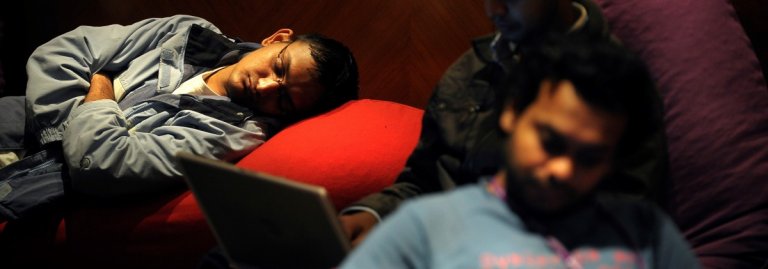
The college schedule is not one easy to catch some Zs in.
Even though research has found that students’ learning process starts improving after 11am and peaks in the afternoon and evening, most colleges start their classes much earlier than that. At some schools, classes have been known to be set at the ungodly hours of 8am or before, to the detriment of its night owl students.
Dr Lawrence Epstein, an instructor of medicine at Harvard Medical School and member of the American Academy of Sleep Medicine’s (AASM) board of directors, says that sleep deprivation affects not only whether a student can stay awake in class but how they perform as well.
“Recent studies have shown that adequate sleep is essential to feeling awake and alert, maintaining good health and working at peak performance,” says Dr Epstein.
“After two weeks of sleeping six hours or less a night, students feel as bad and perform as poorly as someone who has gone without sleep for 48 hours. New research also highlights the importance of sleep in learning and memory. Students getting adequate amounts of sleep performed better on memory and motor tasks than did students deprived of sleep.”
College may be an impossible place to get some valuable shut-eye in yet, believe us, it is possible to get enough sleep to experience the full range of benefits it can provide (your grades will thank you too).
Here are the five top tips provided by the AASM to help students get the most out of their sleep:
1. Stay out of bed

Studying should be done anywhere but on your bed. Source: AFP/Amir Makar
Cardinal rule number one: The bed is a no-go zone for anything else apart from sleep.
If you plan to study, read, watch TV or Skype with your family back home, do it anywhere else – the toilet, the lawn, the Student union, etc – but the bed.
2. Limit naps
While it may seem like a good idea to take naps to make up for lost sleep because of that early lecture, science says it isn’t always a good idea.
Professor of neuroscience and psychology at the University of California Berkeley and author of the book “Why We Sleep” said naps are a “double-edged sword” because it stops us from increasing our sleepiness or sleep pressure. The more sleep pressure, the faster to fall and stay asleep at night.
Napping will “release” some of that sleepiness. Thus, making it harder to fall and stay asleep at night.
“So the advice would be if you don’t struggle with your sleep and you can nap regularly, then naps are just fine.”
Also, keep it to less than an hour and before 3pm.
3. Wake up on the weekend
It may be tempting to stay up all night on Fridays (it is the weekend after all) until the wee hours of Saturday morning, it’s best to wake up at the same time on Saturday and Sunday as you do during the school week.

Catnaps are fine, but only if you really, really need them. Source: Wes Hicks on Unsplash.
Catch up on lost sleep by taking naps on the weekend but not by sleeping in later as it will make waking up for classes on Monday morning painful. Very painful.
4. Avoid caffeine
Coffee and college are inseparable – how else are you going to finish that assignment without some roasted bean power energising your brain juices?
While a temporary burst of energy from caffeine is necessary, it can stay in your system for hours and cause you to lose precious shut-eye at night. A good compromise would be to avoid caffeine – that includes energy drinks – in the afternoon and at night.
5. Adjust the lights
The scourge of modern times is our utter dependence on digital devices. College students are no exception to humanity’s collective addiction to our smartphones. The problem with this is the blue light it emits, which disrupts your body’s sleep clock, making it unable to know the time to sleep.
To overcome this, limit use of digital devices and cut them out completely a few hours before your bedtime. You can also let the sunlight in in the morning to make you more alert as well as dim lights in the evening.
Dimming the lights in the evening and at night will ensure your body knows it will soon be time to sleep. Letting in the sunlight in the morning is to boost your alertness.
6. Wind down

Get away from the screen. Source: AFP/Fahd Shaheed
It’s hard to let go of our smartphones. All of us are guilty of scrolling through social media just before or even way past our bedtime.
But our body needs to “wind down” in order for it to get quality sleep. As such, allocate some “wind down” time before going to bed. This means turning off the computer, smartphone, TV and all other digital devices so you can relax quietly for 15 to 30 minutes.
7. Eat a little
With so many classes to go to, the only proper meal one can actually have is at the end of the day. Eating a large meal late, however, will not only spoil your sleep, but cause you to gain weight.
University students were also found to suffer from gastrointestinal discomfort or have disturbing dreams when they ate late at night.
This doesn’t mean you can’t eat at all even if you’re hungry. As long as it is healthy or light, a snack wouldn’t hurt and may even aid weight loss.
Liked this? Then you’ll love…
For better grades, sleep at the same time every day – study
Canadian unis offer ‘drunk tanks’ for students to sleep off drunkenness safely







